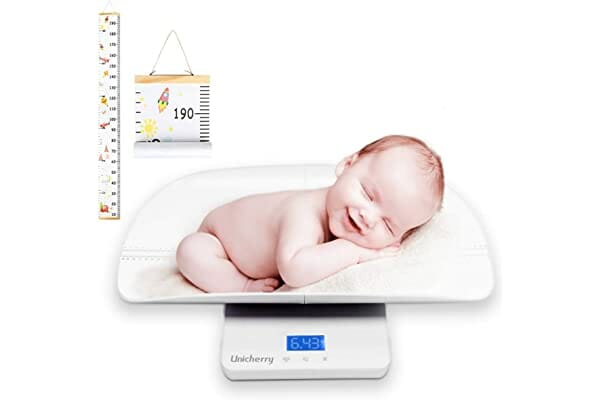Just like many other parents, you might be wondering if your baby is growing normally. A healthy baby can be a range of sizes, but the course of development tends to be fairly predictable. Whenever you go for checkups, the doctor will check your baby’s weight, height, and age to see if your child is growing as expected.
Weight is an indicator of good nutrition and physical development. It is very helpful to know about your baby’s weight in the first year, month by month. Every newborn weight is different.
Just like adults, babies come in different shapes and sizes and every baby is unique. If a baby’s weight is in a lower percentile, it does not necessarily signal that there is a problem with their growth or physical development. With this in the back of your mind, making use of a weight chart can help a person generally track their baby’s development or growth.
The Centers for Disease Control and Prevention (CDC) recommend that we should make use of the World Health Organization (WHO) weight chart for babies up to 2 years of age.
In this article we have described the average weight of a baby from birth, by month in the first year. We have also talked about the factors that affect a baby’s weight.
The first thing you learn about after delivery is how much your baby’s weight is at birth. With this information it will help the healthcare provider to assess your baby’s health and development, most especially when the weight is tracked over time.
Average Newborn Weight At Birth

A full-term baby’s weight is between 3.2kg and 3.4kg at birth.
Just as mentioned before, being on the smaller or larger side at birth is not necessarily a sign of problem, but your baby’s healthcare provider will watch your baby carefully during the first few days to make sure that everything’s OK and that any medical or developmental issues are diagnosed and being addressed.
Your baby’s weight at birth may not indicate how tall or short, big-boned or petite, muscular or lean your baby will become as an adult. Though you will have to wait and see what he/she will look like as an adult. Typically, a child will grow up to look like his/her biological parents whether they are tall, short, fat or slim.
Factors That Can Affect Your Baby’s Weight At Birth
- Genetics: If you or your partner is tall or large-boned, your baby may be a little bit larger than an average baby at birth. The same goes if you or your partner are short or petite: Your baby may be smaller than average at birth.
- The Pregnancy Length: Your newborn may be bigger if he/she was born on or after her due date. Babies that are born earlier than their due dates, particularly if they are born preterm, are usually smaller.
- Poor Diet During Pregnancy: Gaining a lot of weight during the course of your pregnancy can make your baby to be born bigger. On the other hand, being malnourished during your pregnancy period may lead to your baby having a lower birth weight.
- Being Pregnant With Multiples: If you are expecting twins or more, your babies may be small so that they can fit in your womb.
- The Health Of Your Baby: The size of your baby at birth may also be a reflection of any underlying medical conditions, including some birth defects and infections.
- Birth Order: Birth order of your baby can also affect the baby’s weight , that is if this is not your first baby, he/she may be larger at birth than your older child was.
- Gender: Girls tend to be slightly smaller than boys at birth. A male (boy) child tends to be bigger than a female(girl) child.
- Your Health: Your state of health can affect your baby’s weight at birth. Your baby may have a lower birth weight if you had high blood pressure or heart problems during your pregnancy. If you have diabetes or are obesed, your baby may be bigger. consuming alcohol, smoking cigarettes, or taking illegal drugs during pregnancy can also affect your baby’s weight.
What Is The Average Newborn Baby’s Weight Each Month In The First Year?
| Boys | Girls | |
| Age | 50th Percentile | 50th Percentile |
| 1 Month | 9 lbs 14 oz (4.5 kg) | 9 lbs 4 oz (4.2 kg) |
|
2 Months |
12 lbs 5 oz (5.6 kg) |
11 lbs 4 oz (5.1 kg) |
|
3 Months |
14 lbs (6.4 kg) |
12 lbs 14 oz (5.8 kg) |
|
4 Months |
15 lbs 7 oz (7.0 kg) |
14 lbs 2 oz (6.4 kg) |
|
5 Months |
16 lbs 9 oz (7.5 kg) |
15 lbs 3 oz (6.9 kg) |
|
6 Months |
17 lbs 8 oz (7.9 kg) |
16 lbs 2 oz (7.3 kg) |
|
7 Months |
18 lbs 5 oz (8.3 kg) |
16 lbs 14 oz (7.6 kg) |
|
8 Months |
19 lbs (8.6 kg) |
17 lbs 7 oz (7.9 kg) |
|
9 Months |
19 lbs 10 oz (8.9 kg) |
18 lbs 2 oz (8.2 kg) |
|
10 Months |
20 lbs 3 oz (9.2 kg) |
18 lbs 11 oz (8.5 kg) |
|
11 Months |
20 lbs 12 oz (9.4 kg) |
19 lbs 4 oz (8.7 kg) |
|
12 Months |
21 lbs 3 oz (9.6 kg) |
19 lbs 10 oz (8.9 kg) |
What Is A Centile Chart?
A baby’s weight chart is called or is also known as a centile chart. The hospital or health center will give you an immunization card which has a baby’s weight gain chart in it.
Your centile chart shows lines that represent a zone within which your baby is expected to grow normally. If they’re on the top line, or centile, it doesn’t mean they’re overweight. Equally, your little one isn’t necessarily underweight if they’re on the lower line. Either way, your baby is still within what’s considered the normal range.
If your baby jumps up or down to the next centile, or begins to go beyond the zone altogether, speak to your paediatrician. But it is usually not anything to be concerned about. Babies will often go through growth spurts, gaining nothing for a couple of weeks, then catching up in one go.
Some babies may not follow the baby’s weight chart very well but this doesn’t mean they’re ill. Exclusively breastfed babies, premature babies or twins all show slightly different weight gain progress. In this case, your paediatrician will use different, specialised charts to check your baby’s weight is growing properly.
This is an outline of what your baby should be weighing with a month by month guide, but for a more detailed overview, take a look at a centile chart that shows week by week measurements.
Recommend:17 Healthy Food For Breastfeeding Mom
Baby Girl Growth Chart
Birth: 5.5lbs to 10lbs
1 month: 6.6 to 14
3 months: 7.7 to 15
6 months: 11.6 to 22
9 months: 13 to 25
12 months: 14.3 to 27
Baby Boy Growth Chart
Birth: 5.6lbs to 11.2lbs
1 month: 6.6 to 13.2
3 months: 9.9 to 18.7
6 months: 11.9 to 23
9 months: 14.3 to 26.2
12 months: 15.6 to 28.4
What’s The Average Baby Length?
The average length for a full-term baby at birth is 20 inches, however, between 18 and 22 inches is considered normal and healthy, says Dr Cichi. According to the University of Michigan, your baby’s head will grow at its fastest rate during the first 4 months after birth than at any other time. This increase is the result of rapid brain growth. The average head circumference at birth is roughly 13.5 in. (34.5 cm). By the end of the first month, it increases to roughly 15 in. (37.6 cm).
How Often Should My Baby Be Weighed?
Your baby’s weight will fluctuate the most in the first few weeks so it’s normal to have them weighed after the first fortnight to check their weight is steadily increasing after taking an initial dip.
Your baby should then be weighed once a month for their first six months, there’s no need to weigh them more than that. From being six to 12 months old your baby should be weighed no more than every other month. Once your baby one has passed their first birthday they shouldn’t need weighing more than once every three months.
Usually, your baby will gain weight most rapidly in the first six to nine months. Their rate of growth will gradually slow down as they become a toddler and are more active. If your baby or toddler is ill, their weight gain may slow down for a while. It will usually return to normal within two to three weeks. If you have any concerns that your baby is underweight or overweight your health visitor can look into this with you.
Is My Newborn Weight Increasing Properly?

Your baby will rely on either breast or bottle to give them the nutrients that they need to keep them growing at the right pace. You can check if your baby is taking in all those nutrients properly by looking out for some of these signs. Here’s a rough checklist that should show if they’re getting enough nutrition in their milk:
- They have yellowy, seedy poo five times a day to begin with, slowing to an average of one a day from three months onwards.
- Their nappies are wet and/or heavy. Hold a fresh one in the other hand and compare the weight of the two if you’re unsure.
- Their wee is clear. If it’s yellow your baby could be dehydrated and not getting enough to drink.
- A bottle has the advantage of giving an accurate measure of how much they’ve taken.
- During breastfeeding, your baby should be making gulpy and swallowing noises.
- They’re happy after a feed and don’t cry for more.
- They’re following the height and weight chart to the satisfaction of your doctor.
Remember, it’s normal to go a few weeks where there’s no gain, sometimes even a small weight loss, usually followed by a growth spurt
Read Also: 9 Effective Home Remedies For Constipation In Babies
Conclusion
It is important to know your newborn weight. Baby’s weight charts can help a healthcare team track a baby’s physical development by comparing the baby’s weight with the weights of others of the same age and sex.
Still, a doctor usually looks for steady growth, rather than a target percentile, when assessing a baby’s physical development. And even if a baby’s weight is in a lower percentile, they will not necessarily be a small adult — just as longer babies do not necessarily become tall adults. As long as your baby’s weight in the first year gets to the average and expected weight.
Knowing about average weights by month can help people gauge their babies’ physical development, but doctors also look for other important indicators, such as length and head circumference.
Healthcare professionals also take into account whether a baby is generally hitting other milestones on time. And by taking a detailed medical history, they can rule out any medical conditions or nutritional considerations that may be preventing a baby from gaining weight appropriately.



